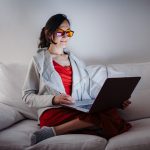Trendy glasses help improve sleep quality and next day work performance, according to study
 (NaturalHealth365) Most of us know what it’s like to have tired, sore, and dry eyes following a long session in front of the computer or television. As part of computer vision syndrome, these temporary symptoms are partially due to powerful blue light emitted from digital devices. Blue light’s high energy allows it to penetrate and interact with cells in your body and, according to the American Optometric Association (AOA), may negatively impact your vision over the long term.
(NaturalHealth365) Most of us know what it’s like to have tired, sore, and dry eyes following a long session in front of the computer or television. As part of computer vision syndrome, these temporary symptoms are partially due to powerful blue light emitted from digital devices. Blue light’s high energy allows it to penetrate and interact with cells in your body and, according to the American Optometric Association (AOA), may negatively impact your vision over the long term.
Blue light does more than threaten eye health, however. For instance, it’s notorious for disrupting sleep. But do those trendy blue light blocking glasses actually do anything? A recent study published in the October 2020 issue of the Journal of Applied Psychology offers some hopeful news.
What does science say about blue light blocking glasses? Study shows technology offers MULTIPLE benefits
Manufacturers of blue light blocking lenses claim that their products filter out most of the blue light emitted from digital and LED devices and prevent the light from reaching your retinas. A team of authors put this to the test by collecting and assessing data from 130 people to determine whether this technology has a practical use.
Their analysis indicates that wearing blue light filtering glasses – especially just before sleeping – is a cost-effective intervention that improved:
- Sleep quality
- Work engagement
- Task performance at work
The authors theorize that the blue light blocking lenses create “physiologic darkness” that improves both sleep quantity and quality. This aligns with other research showing how blue light affects part of the brain involved in the circadian rhythm, aka the body’s sleep-wake cycle.
In short, too much blue light exposure – especially at night – may shift your circadian rhythm toward a more wakeful state. Excessive blue light exposure has even been shown to suppress the release of melatonin, an important hormone for sleep.
The researchers found that night owls – people who naturally prefer to stay up late – gained more benefits from wearing the blue light filtering lenses than morning people. However, they conclude that this technology still appears promising as a way to help people “live and work better.”
And yes, this technology is also good for your eye health. One small pilot study from the Journal of Medical Imaging found that blue light blocking glasses relieved symptoms of computer vision syndrome better than sham glasses among 10 radiology residents.
Want better sleep, work productivity, and eye health despite daily use of digital devices? Here’s a round-up of your blue light blocking options
If you have prescription eyeglasses, ask your eye doctor about getting your current pair coated in blue light blocking film, or consider upgrading to a new pair that already comes with this technology. Don’t need vision correction? No problem: plenty of companies make blue light blocking lenses that are prescription-free, so you can still use your computers and digital devices more safely.
If you’d rather not wear glasses, consider installing blue light blocking screens or applications directly onto your devices. In the meantime, keep your screens clean and adjust ambient lighting to reduce glare while using your devices.
Sources for this article include:
ScienceDaily.com
NIH.gov
APA.org
AOA.org
NIH.gov
Harvard.edu
Harvard.edu



